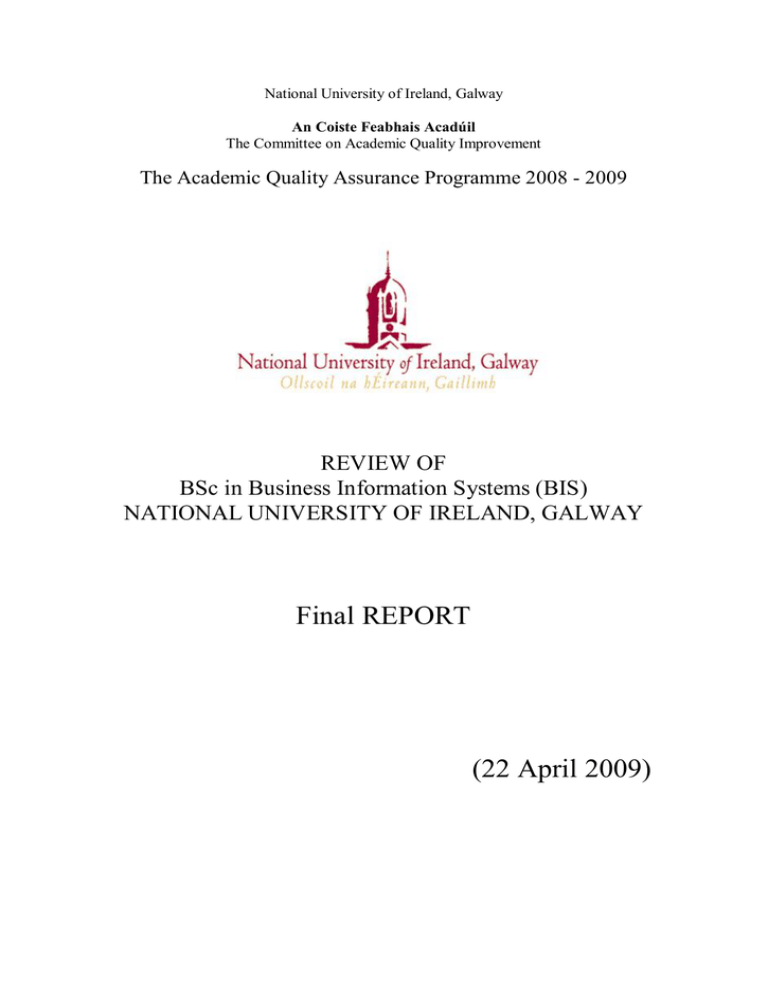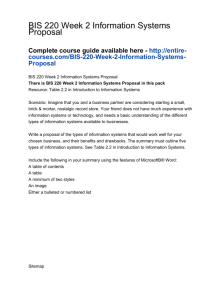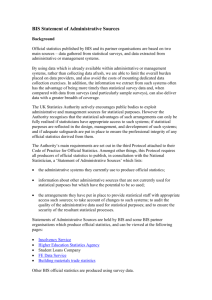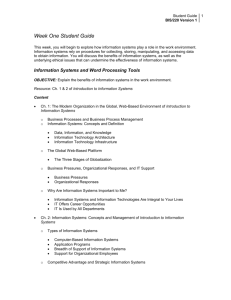Final REPORT (22 April 2009) REVIEW OF BSc in Business Information Systems (BIS)
advertisement

National University of Ireland, Galway An Coiste Feabhais Acadúil The Committee on Academic Quality Improvement The Academic Quality Assurance Programme 2008 ­ 2009 REVIEW OF BSc in Business Information Systems (BIS) NATIONAL UNIVERSITY OF IRELAND, GALWAY Final REPORT (22 April 2009) B.Sc. in Business Information Systems (BIS): Review Report 2008–09 This report arises from a visit by a review group to the J.E. Cairns School of Business and Economics on the 27 th of February, 2009. The Programme’s Board had already prepared and submitted a 'Self Assessment Report' that, with other documentation, was made available to the RG well in advance of the visit. The Review Group consisted of: Mr. Liam Ryan, Managing Director, SAP SSC (Ireland) Ltd., (Chairperson); Dr. Regina Connolly, Senior Lecturer, Dublin City University; Professor Ephraim R. McLean, Computer Information Systems Department, Robinson College of Business, Georgia State University; Dr. David Collings, Discipline of Management, NUI, Galway, and Dr. Niall Geraghty of the School of Chemistry, NUI Galway acting as Rapporteur. The report is structured to cover the following main topics: 1. Aims and Objectives 2. Organization and Management 3. Programmes and Instruction 4. Scholarship and Research 5. Community Service and the Wider Context 6. Summary and Concluding Remarks 1. Aims and Objectives The BSc in Business Information Systems (BIS) undergraduate degree was designed to provide a high quality degree that would offer attractive career opportunities for its graduates in the context of an increasing need in the Irish economy for professionals with well­developed technology, management and business skills. The central objective of the 4­year programme is to produce high­calibre graduates with the business analysis and applied information systems skills needed in the organisation and management of enterprises. The programme offers an international student exchange component in year 2 where students have the opportunity to spend half of their second year studying in a foreign University. A paid industry work placement for all students is a critical facet of the BSc in BIS. The programme is fundamentally sound with a committed faculty who are to be commended for their dedication to the programme. The quality of the graduates and their employability reflects very positively on the programme and upon those delivering it. The programme has clear and easily accessible aims and objectives that are appropriate to the strategic plans of the University, College and School. The BIS programme itself does not have a strategic plan. This is something that the (Review Group (RG) recommends be drawn up as it would facilitate the development of the programme and also serve as input to the College or University strategic plan. 2 B.Sc. in Business Information Systems (BIS): Review Report 2008–09 2. Organization and Management The RG is satisfied that the programme is well managed. The programme is led by a committed Programme Director supported by a Programme Board. Programme Board minutes suggest that the board were well engaged and attendance was consistently good. Meetings with faculty and student feedback clearly indicated that the Programme Director and the Programme Board managed the programme in an efficient and student centred manner. The Industry Advisory Board is also a commendable innovation and in line with best practice nationally and internationally. While it appears that this Board did inform the curriculum, it was difficult to establish the actual extent of the Board’s input owing to the lack of documentation of board meetings. Thus the RG suggests better and more comprehensive documentation of past meetings would be advisable. Furthermore, in line with the suggestion to formulate a strategic plan for the future direction of the programme, the composition of the Industry Advisory Board may need to be re­ evaluated moving forward. For example the RG noted that the Industry Advisory Board was almost exclusively composed of vender companies. While this may be appropriate if these companies represent the primary employers of graduates, the RG suggests that if the destinations of graduates are likely to change in the future this should be reflected in the composition of the Board. There are regular meetings with student representatives from the programme. The students interviewed by the RG expressed their satisfaction with the outcome of these student­staff interactions. Hence the RG is satisfied that student views are incorporated in the programme management. However, the RG suggests that in the future such meetings should be better documented. This would be particularly useful for future accreditation purposes. The RG had a significant concern around the level of administrative support provided to assist the Programme Director and the Programme Board. The only administrative support provided is in fact through a part­time administrative assistant. While the RG compliments the commitment of the administrator to the programme, the level of support provided is completely insufficient. This results in these administrative duties being taken over by faculty to the detriment of their other duties. Similarly, no appropriate level of marketing is available to the programme to support attracting students, employers and other interested stakeholder. This lack of professional administrative support is a significant concern of the RG. The declining CAO points are a source of considerable concern to all stakeholders with whom the RG met, including the graduates. The key concern related to the quality of the graduates entering the programme at the lower end of the points range. However, the external perception of the programme also emerged as a significant concern. The mismatch in the current year between the management of offers and acceptances needs to be improved. In addition the RG is of the opinion that the Dean should be consulted to a greater degree in the offer process. The RG also noted the two vacant positions in the BIS group and recommends that these should be filled as promptly as possible. Notwithstanding, the requirement to fill the posts promptly, the RG is of the view that if the programme is to develop further, there is urgent need for a senior academic appointment to be made, at professorial level. 3 B.Sc. in Business Information Systems (BIS): Review Report 2008–09 Finally the Review Board noted with concern the current situation with regard to the operating budget for the programme. In this regard, the Board suggests that the budget for the programme should be commensurate with the enrolment. 3. Programmes and Instruction A careful review of the course of instruction in the BSc in Business Information Systems found it to be well developed, well balanced, and up to date. In keeping with its location in the School of Business and Economics, the course content strikes a good balance between technical and managerial subject matter. Because many of the graduates accept employment in computer companies and consultancies, there was some discussion as to whether the technical component of the programme should be expanded; but the RG felt that no changes were needed at this time. It compares well with other programmes on the international scene. This assessment was confirmed in the reports of the External Examiners that were supplied to the RG. These reports stated that the examination papers and scripts that they reviewed were of a high standard and reflected good examination practice. In conversations with the RG, current students and recent graduates uniformly gave high marks to the programme and the staff. Even courses that were not particularly well received by the students while they were taking them (e.g., first­year Accounting), were felt by them, upon reflection, to be worthwhile contributions to their education. The students also felt that the staff was very friendly and approachable, building a very congenial community. A particularly noteworthy part of the curriculum is the third­year, second semester Professional Experience Programme, or “placement,” for short. Alumni with whom the RG spoke commented in particular on how valuable this six­month experience was. One concern of the RG about this industry placement experience is that it is not awarded university course credit. If the placement activity is to be awarded university course credit and is to contribute to students' learning, then it will have to be carefully structured and monitored even more closely by staff to ensure that such learning takes place. Such monitoring will require additional resources. A further by­product of the lack of course credit for the placement is that the third­ year fall semester, which precedes the placement, is very heavily loaded. Giving credit to the placement would even out this imbalance. Another initiative, just being undertaken, is the SAP University Alliances Programme and the ERPSim learning module. This should become operational in the fall of 2010. Against this positive view of the BIS curriculum and programme, the RG had a very serious concern about student performance in the programme. Quoting from the Self­ Assessment Report prepared by the BIS staff (pp. 29­30), the Summer, Autumn failure rates for 2008 were as follows: first year – 76%, 24%; second year – 74%, 47%; third year – 50%, 33%; and fourth year – 18%, 50%. These failure rates are extremely high and should not be allowed to continue. One reason for this poor performance on the part of the students is that many of them are ill prepared for the demands of university work. The CAO points for the incoming 2008 class were 300, 85 points below a comparable entering class at UCC and 80 points below the BIS class that entered NUI, Galway, in 2003. This “input” problem, and possible remedies, is addressed elsewhere in this report. There are steps that have been taken to address this issue, but more needs to be done. 4 B.Sc. in Business Information Systems (BIS): Review Report 2008–09 One successful initiative was the temporary appointment of an Applied Computing Teacher (ACT) for the five­year period 2002­2008. This contract position was funded by the external Information Technology Investment Fund. It has since been discontinued out of a concern that if it were to continue, it would convert into a permanent position and thus become a responsibility of the University, a responsibility that the University was unwilling to assume. This is unfortunate, because the ACT was very effective in working with poor performing students and helping them make the transition from level­two to level­three work. No one is now available to perform this function on a full­time basis. To the extent that it happens at all, it is done by the already overworked staff. If a full­time administrator (addressed elsewhere in this report) were to become available, some of this remediation work could be done by her/him. One first­year course that is particularly challenging for students is the Accounting course, with failure rates consistently around 50%. Here too initiatives have been undertaken to improve student performance. They involve (1) offering smaller­sized classes (rather than the typical 200­250 class size) with the class material tailored to non­accounting students (i.e., BIS students); (2) the use of My Accounting learning materials; and (3) more frequent tutorials. In spite of these efforts, failure rates remain high and continuing attention needs to be devoted to this problem. There are other steps that should be taken to improve student performance. For starters, students don’t come to class! It is not unusual for classes to have absences as high as 70% on an ongoing basis, particularly in the first two years. Attendance is not required and there no penalties for missing class or rewards (i.e., grades awarded for attendance and participation) for regular attendance. Students who have just finished their second­level schooling are still immature and they need structure before they are ready to handle their new­found freedoms. Class attendance should be made mandatory, especially for the first two years. Another problem is the lack of examinations at Christmas in the first year. Students go through their entire first year without any substantial feedback on their performance – or lack thereof. As indicated above, most students are ill prepared to undertaken university­level work, at least initially; and they need early, and frequent, feedback on their performance. Two changes should be initiated. First, exams should be held at Christmas time the first year as they are in succeeding years. And second, continuous assessment – quizzes, exercises, homework – should be instituted in all courses, with appropriate grade credit being assigned. The RG realises that the above findings and recommendations about the programme and instruction may not be easy to implement, may require funding and resources that are not readily available, and may put an even heavier load on the BIS staff; but the resulting improved outcomes should be worth the effort. 4. Scholarship and Research The RG is satisfied that the BIS programme staff have demonstrated a commitment to academic scholarship and commend them for same. While a number of staff members have still to complete their doctorates, they are in the process of doing same and are commended for this. 5 B.Sc. in Business Information Systems (BIS): Review Report 2008–09 However, the heavy load of administrative duties currently covered by the faculty has had a significant impact on research productivity. In order for research productivity to be improved, teaching relief will need to be provided. There is no senior faculty member in the group to mentor BIS researchers. There is an urgent need to make an appointment at established professorial level to mentor or direct staff in their research. Without this type and level of leadership, the quantity and quality of faculty research outputs will continue to suffer. This is particularly important if the University’s strategic objectives in relation to accreditation are to be achieved. More consideration needs to be given to the development of fourth level research in line with the University’s strategic plan. This should take the form of cross­school programme development using the BIS programme as a feeder undergraduate programme. 5. Community service and the wider context All the stakeholders including college faculty, students and the wider community are well served by this programme. The graduates of this programme are very employable and as such become net contributors in both financial and social terms. There is also evidence that some of the final year projects were geared towards research of IS in the community and the RG recommends that such association is further encouraged into the future. 7. Summary and Action Points Summary · The BIS programme is fundamentally sound with a committed faculty. It compares well with similar programmes on the international scene. · The quality of the graduates and their employability reflects very positively on the programme. · The programme has aims and objectives that are appropriate to the strategic plans of the University, College and School. · The Programme Director and the Programme Board manage the programme in an efficient and student centred manner. · The Industry Advisory Board is in line with best practice nationally and internationally. Meetings of the Board should however be better documented and its composition reviewed periodically to ensure, for example, that it reflects the areas where students are securing employment. · Students in the programme are happy with how student­staff interactions are conducted and with how their views are incorporated in the management of the programme. · The RG had a significant concern relating to the level of administrative support provided to the Programme Director and the Programme Board. · The programme would benefit from having access to professional marketing support. · The declining CAO points for entry into the programme are a source of considerable concern to all stakeholders. 6 B.Sc. in Business Information Systems (BIS): Review Report 2008–09 · There is an urgent need to fill the two vacant positions in the BIS group and, in order to provide academic leadership, to make a senior academic appointment at professorial level. · The courses in the BSc in Business Information Systems are well developed, well balanced, and up to date and strike a good balance between technical and managerial subject matter. · The RG noted that the programme’s External Examiners had expressed their satisfaction with the examination papers and scripts they had reviewed, considering them to be of a high standard and to reflect good examination practice. · The RG is concerned that the industry placement experience is not awarded university course credit. If it is to be awarded course credit and is to contribute to students' learning, then it will have to be carefully structured and monitored even more closely by staff. · A very serious concern was expressed by the RG about student performance in the programme, as evidenced by the extremely high failure rates. · The RG accepts that initiatives have been undertaken to address this issue, such as the appointment of an Applied Computing Teacher (ACT). It regrets that this position has been discontinued. · The teaching of traditionally challenging courses such as Accounting in small classes, with course content tailored to BIS students, and with the use of MY Accounting learning materials, is another very welcome initiative. · The levels of attendance at lectures, particularly in the first two years when it can be as low as 30%, needs to be addressed as a matter of urgency. · The introduction of Semester 1 examinations and continuous assessment in all courses in the first year would provide students with early, and frequent, feedback on their performance. · The RG is satisfied that the BIS programme staff have demonstrated a commitment to academic scholarship. · More consideration needs to be given to the development of fourth level research in line with the University’s strategic plan. · All the stakeholders including the University, College, School, students and the wider community are well served by this programme. Action Points · A strategic plan for the BIS programme should be drawn up. · Better and more comprehensive documentation relating to meetings of the Industry Advisory Board should be maintained. · The composition of the Industry Advisory Board should be reviewed in the light of the recommendations of the RG. · Documentation relating to staff­student meetings should be maintained. · Additional administrative support should be provided for the Programme Director and the Programme Board. · An appropriate level of professional marketing support should be made available to the programme. 7 B.Sc. in Business Information Systems (BIS): Review Report 2008–09 · Steps should be taken to ensure that the mismatch that occurred in the current year in the management of offers and acceptances is not repeated. · The two vacant positions in the MIS group should be filled and a senior academic appointment should be made at professorial level. · The budget for the programme should be commensurate with its enrolment. · The Programme Board should strongly consider allocating course credits to the Professional Experience Programme in the third year. · Class attendance should be made mandatory, especially for the first two years. · Semester 1 examinations and continuous assessment in all courses should be introduced in the first year of the programme. · Teaching relief should be provided in order to improve research productivity. Mr. Liam Ryan (Chair) Professor Ephraim R. McLean Dr. Regina Connolly Dr. David Collings Dr. Niall Geraghty (rapporteur) (22 April 2009) 8 B.Sc. in Business Information Systems (BIS): Review Report 2008–09 Comments on the Methodology of the Review Process 1. The RG were happy with the Self­Assessment Report and with the level co­ operation provided by the staff of the BIS group. 2. The failure to include External Examiners Reports in the documentation provided for the RG was surprising. However these were provided when requested and it should be pointed out that such reports do not appear in the “Documents to be Provided” list in the Guidelines for the Academic Quality Assurance Programme 3. The occasional change in the list of people being interviewed was somewhat disorientating. 9




